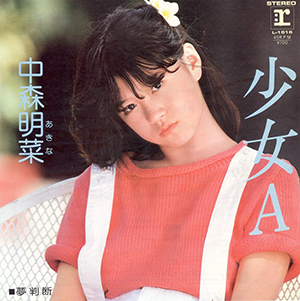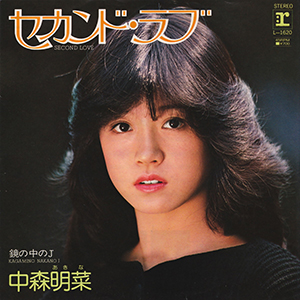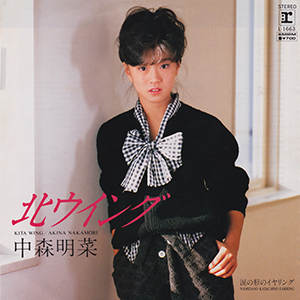
Akina Nakamori is a Japanese singer and actress. She is one of the most popular and best-selling artists in Japan. Akina achieved national recognition after winning the 1981 season of the talent show Star Tanjō!. Her debut single "Slow Motion" was released to moderate success, peaking at number thirty on the Oricon Weekly Singles Chart. Nakamori's popularity increased with the release of her follow-up single, "Shōjo A", which peaked at number five on the Oricon charts and sold over 390,000 copies. Her second album Variation became her first number-one on the Oricon Weekly Albums Chart, staying in that position for three weeks.

Best III is the fifth compilation album by Japanese singer Akina Nakamori. It was released on 10 November 1992 through Warner Music Japan label.

"Jukkai (1984)" is the ninth single by Japanese entertainer Akina Nakamori. Written by Masao Urino and Masayoshi Takanaka, the single was released on July 25, 1984 by Warner Pioneer through the Reprise label. It was also the second single from her sixth studio album Possibility.

Shaker is the seventeenth studio album by Japanese singer Akina Nakamori and third studio album to be released during the 1990s. It was released on 21 March 1997 under the MCA Records label. The album includes lead singles "Moonlight Shadow: Tsuki ni Hoero" and "Appetite". It was Nakamori's final album released under MCA Records, before her transfer to Gauss Entertainment label.

Unbalance+Balance is the fifteenth studio album by Japanese singer Akina Nakamori and first studio album to be released during the 1990s. It was released on 22 September 1993 under the MCA Records label

Spoon is the eighteenth studio album by Japanese singer Akina Nakamori and fourth studio album to be released during 1990's. It was released on 17 June 1998 by Gauss Entertainment. The album includes lead singles "Kisei " and "Kon'ya, Nagareboshi". It was Nakamori's first album released under the This One label of Gauss Entertainment.

"Slow Motion" is the debut single by Japanese entertainer Akina Nakamori. Written by Etsuko Kisugi and Takao Kisugi, the single was released on May 1, 1982 by Warner Pioneer through the Reprise label. It was also the first single from her debut studio album Prologue (Jomaku).

"Shōjo A" is the second single by Japanese entertainer Akina Nakamori. Written by Masao Urino and Hiroaki Serizawa, the single was released on July 28, 1982 by Warner Pioneer through the Reprise label. It was also the first single from her second studio album Variation (Hensoukyoku).

"Second Love" is the third single by Japanese entertainer Akina Nakamori. Written by Etsuko Kisugi and Takao Kisugi, the single was released on November 10, 1982, by Warner Pioneer through the Reprise label. It was also the lead single from her third studio album Fantasy (Gensoukyoku).

"Kita Wing" is the seventh single by Japanese entertainer Akina Nakamori. Written by Chinfa Kan and Tetsuji Hayashi, the single was released on January 1, 1984, by Warner Pioneer through the Reprise label. It was also the lead single from her fifth studio album Anniversary.

"Meu amor é..." is the 11th single by Japanese entertainer Akina Nakamori. Written by Chinfa Kan and Naoya Matsuoka, the single was released on March 8, 1985, by Warner Pioneer through the Reprise label. It was also the lead single from her eighth studio album D404ME.

"Futari Shizuka: Tenkawa Densetsu Satsujin Jiken yori" is the 26th single by Japanese entertainer Akina Nakamori. Written by Takashi Matsumoto and Makoto Sekiguchi, the single was released on March 25, 1991, by Warner Pioneer through the Reprise label. It was also the third single from her fifth compilation album Best III. This was Nakamori's final release under Warner Pioneer.

"Gekka" is the 30th single by Japanese entertainer Akina Nakamori. Written by Gorō Matsui and Shūgō Kajiwara, the single was released on October 5, 1994, by MCA Victor.

"Moonlight Shadow: Tsuki ni Hoero" is the 33rd single by Japanese entertainer Akina Nakamori. Written by Toshihiko Takamizawa and Tetsuya Komuro, the single was released on August 7, 1996, by MCA Victor. It was also the lead single from her 17th studio album Shaker.

"Kisei (Never Forget)" (帰省 〜Never Forget〜, lit. "Homecoming (Never Forget)") is the 35th single by Japanese entertainer Akina Nakamori. Written by Yasuhiro Suzu and Atsuko, the single was released on February 11, 1998, by Gauss Entertainment (a subsidiary of Daiichikosho) under the This One label. It was also the lead single from her 18th studio album Spoon.

"Tomadoi" is the 37th single by Japanese entertainer Akina Nakamori. Written by Hiromi Mori and Juni, the single was released on September 23, 1998, by Gauss Entertainment under the This One label. It was also the lead single from her 19th studio album Will.

"Ophelia" is the 38th single by Japanese entertainer Akina Nakamori. Written by Aki Shimogō and Satoshi Shimano, the single was released on January 21, 1999, by Gauss Entertainment under the This One label. It was also the second single from her 19th studio album Will.

"Trust Me" is the 39th single by Japanese entertainer Akina Nakamori. Written by Seriko Natsuno and Kazuhiro Hara, the single was released on December 1, 1999, by Gauss Entertainment under the This One label. It was also the third single from her 19th studio album Will. This was Nakamori's final single under Gauss Entertainment.

"The Heat (Musica Fiesta)" is the 41st single by Japanese entertainer Akina Nakamori. Written by Adya and Uru, the single was released on May 2, 2002, by Universal Music Japan under the Kitty MME label. It was also the second single from her 20th studio album Resonancia.

"Diva Single Version" is the 47th single by Japanese entertainer Akina Nakamori. Written by Ryohei Matsufuji, Philippe-Marc Anquetil, Chris Lee-Joe, and Emma Rohan, the single was released on September 23, 2009, by Universal Sigma. It was also the lead single from her 23nd studio album Diva.




















